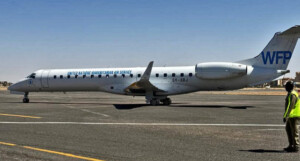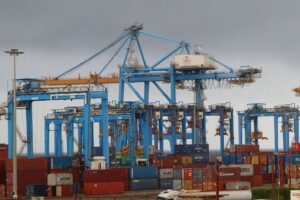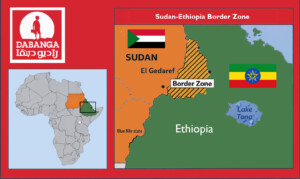No-fly zone over Sudan-Ethiopia border area begins
The Sudanese Civil Aviation Authority set up a no-fly zone over El Fashaga border area in El Gedaref yesterday, after an Ethiopian military warplane entered Sudanese airspace on Wednesday.
 Sovereign Council member, Lt Gen Shamseldin Kabbashi (File photo)
Sovereign Council member, Lt Gen Shamseldin Kabbashi (File photo)
Yesterday, the Sudanese Civil Aviation Authority set up a no-fly zone over El Fashaga border area in El Gedaref, after an Ethiopian military warplane entered Sudanese airspace on Wednesday.
Aircraft will not be allowed to fly above El Fashaga border area lower than 29,000 feet. The restriction is effective from January 14 to April 11.
Minister of Information, Feisal Mohamed Saleh, denied that Sudan and Ethiopia are in conflict over the border in a press statement at Khartoum Airport.
The actual demarcation of the borders on the ground can be considered a settled matter, he said, given that the status of the borders is determined by agreements signed by Ethiopia, including the 1903 and 1972 accords.
Sovereign Council member, Lt Gen Shamseldin Kabbashi, and his delegation returned to Khartoum yesterday evening, after a one-day visit to Egypt to brief President Abdelfattah El Sisi about the situation in El Gedaref.
The Information Minister said that the delegation’s visit was part of a programme of visits to Chad, South Sudan, Saudi Arabia, and Eritrea to inform them about Sudan's position on the developments in the region.
“We need to address our contentious issues and our problems by intensifying peaceful efforts that are based on political and diplomatic means, dialogue and negotiation,” he said.
“Sudan does not intend to carry out any military actions unless it is forced to do so and does not encroach on Ethiopian lands and has no ambitions in it,” he explained. “The redeployment of the army forces and control over Sudanese lands on the eastern borders is a natural matter to protect the borders and the security of citizens and their agricultural lands.”
Saleh further said he hopes that new negotiation sessions of the Joint Border will progress.
Mediation offer
Salva Kiir, President of South Sudan, has announced his readiness to mediate between Sudan and Ethiopia in order to reach a political and diplomatic solution to the border issues.
Tut Galuak, Security Advisor to Kiir and Chair of the South Sudanese team that mediated the Juba Peace Agreement between the Sudanese government and a number of rebel movements in the country, is currently visiting Khartoum.
In a press conference yesterday, Galuak said that Sudan’s Sovereign Council President, Abdelfattah El Burhan, wants “an amicable and fraternal solution to the border disputes with Ethiopia”. He indicated that Sudan's current presidency of the East African Intergovernmental Authority on Development (IGAD) will contribute to resolving the issue through regional organisations.
Military activity
Tomorrow evening, a campaign will be launched in support of the Sudan Armed Forces (SAF) in the Friendship Hall in Khartoum. Lt Gen Abdelfattah El Burhan, Chairman of the Sovereign Council and Prime Minister Abdallah Hamdok will attend the ceremony.
El Hadi Idris, head of the Sudan Revolutionary Front (SRF) rebel alliance announced yesterday that the SRF forces stand by the army and “will exert all efforts to protect the Sudanese lands.”
After incidents on Sunday, in which Sudanese army forces were able to repel an Ethiopian attack, Ethiopian forces reportedly set up an ambush by stationing snipers with automatic rifles on top of dense trees. The ambush was supposed to target Sudanese soldiers but killed civilians instead.
Ethiopian militiamen launched an attack on Leya, El Gureisha locality in El Gedaref, on Monday in a separate attack, killing six women and a child while they were harvesting sorghum.
The Sudanese Women’s Union condemned the assassination of the victims. It called on the government to extend its authority in the border areas and protect its citizens, especially women.
Background
The war in Tigray, Ethiopia, began in early November last year between combatants of the Tigray Regional Government and forces supporting Ethiopian Prime Minister Abiy Ahmed. Ahmed receives military support from Eritrea. Tens of thousands of Ethiopians have fled the region to eastern Sudan.
In early December, about a month after the civil war broke out in neighbouring Tigray, Sudanese army forces regained control of lands in El Fashaga at the El Gedaref-Tigray border. The fertile lands were occupied by Ethiopian gunmen and militant farmers for decades. Farmers in El Fashaga, backed by the El Gedaref governor, demanded in July last year that these lands be returned to them.
The 1,600 kilometres-long border between Sudan and Ethiopia was drawn in colonial times. No clear demarcation of the border has been made since Sudan became independent in January 1956.
Border demarcation talks between Sudanese and Ethiopian government delegations in Khartoum concluded without an agreement on December 23. The Ethiopian delegation reportedly refused to recognise the 1903 border demarcation, saying that the British-Ethiopian treaty on the border was signed in colonial times.
In Khartoum, political leaders called for the expulsion of the Ethiopian ambassador because of his “provocative statements” on Wednesday.
Radio Dabanga’s editorial independence means that we can continue to provide factual updates about political developments to Sudanese and international actors, educate people about how to avoid outbreaks of infectious diseases, and provide a window to the world for those in all corners of Sudan. Support Radio Dabanga for as little as €2.50, the equivalent of a cup of coffee.












 and then
and then